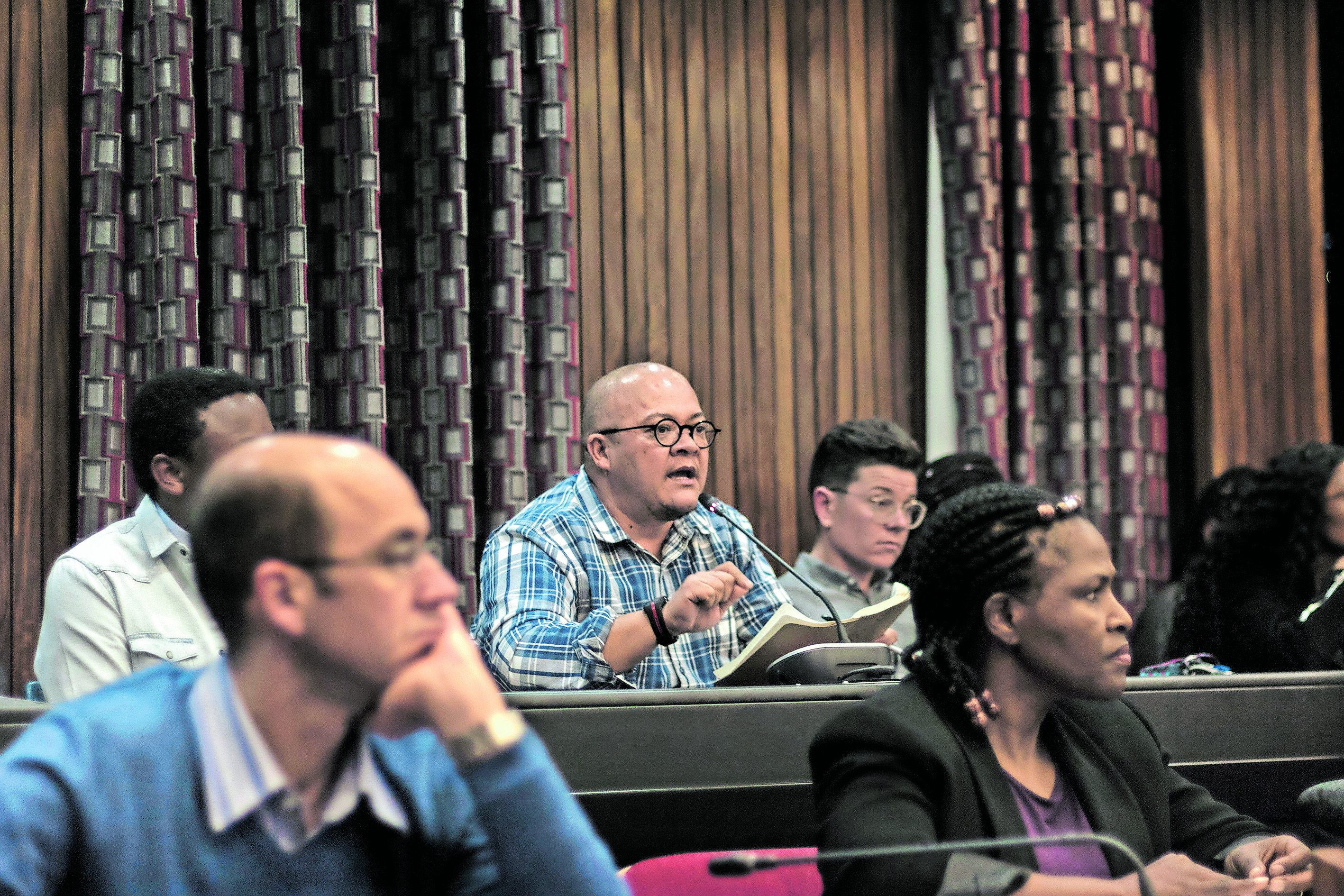Speakers at the Critical Thinking Forum hosted by the Mail & Guardian at Wits discuss the many issues around fully integrating LGBTQI people into South Africas institutions of higher learning. (Photos: Tadeu Andre)
A Critical Thinking Forum was hosted by the Mail & Guardian on August 14 2018 in partnership with the Health Wellness and Development Centre (HeAids), the University of the Witwatersrand (Wits), Accountability International and Gay and Lesbian Archives of South Africa (Gala).
Convened at Senate House at Wits, many pertinent issues were discussed under the theme “What do we know, what do we do? LGBTIQ+ in higher education.”
Moderated by Gugu Mhlungu, the panel consisted of Dr Peace Kiguwa, senior lecturer at Wits, Ricki Kgositau, executive director at Accountability International and Piwe Pitsha, a student from the Walter Sisulu University. Dr Ramneek Ahluwalia, chief executive of HeAids added his expertise.
Studies from the South African Journal of Higher Education on sexualities in higher education indicate that most institutions in SADC are still heteronormative and that both LGBTIQ staff and students are still discriminated against and marginalised. Major themes from the journal relating to education and training, sexual health, awareness raising and advocacy as well as citizenship were central to the discussions of the night.
The discussions kicked off with Professor Tawana Kupe, acting vice-chancellor and principal at Wits. His opening remarks regarding inclusivity set the stage for the discussions that followed. The daily practice of accepting people for who they are and not how they are identified by others is of paramount importance to transformation in institutions of higher learning and society at large.
Kupe noted: “The concept of inclusivity can be dangerous, because the question of what an inclusive community looks like then arises. In the context of social justice, it reinforces bias and prejudice. If you are going to destabilise heteronormativity, you do not want to be included in a society where people agree to accept you as different, but they are the norm. You actually want that which is the norm to be destabilised.”

Dominant narratives perpetuate the social marginalisation of LGBTIQ-identifying people in South Africa to this day. Pitsha noted the importance of such dialogues as vital for transformation to occur: “It is very difficult to exist in a society where people do not understand what LGBTIQ is all about. We have to move to a point where institutions of higher learning cease to think of LGBTIQ identifying people as ‘not normal’. In a sense, they fail to accommodate such identifying students adequately within university spaces.”
Peer-to-peer led programmes, such as those led under HeAids, are vital, according to Ahluwalia. Everyone has to come on board for such transformation to occur within institutions of higher learning and society. “We all need to engage so that the second curriculum happens through peer-to-peer. The integration of the LGBTIQ population as the first curriculum has to occur, so that they enjoy their full rights the way everyone else enjoys their human rights in any form in our democratic nation.”
Removing a deep-seated prejudice is a long process of socialisation. It did not come overnight. The timely unfolding of it all is a key factor. “It takes time to change, but we do not have time,” noted Kiguwa. “Change is not going to happen only because we change the policy or bring about different types of transformation efforts at a level of structures. We need to do the work of changing the way people think about difference and diversity. Violence in different forms, beyond physical body harm, or material still occurs. Violence at other levels, such as when identities are not recognised, a lack of visibility in curriculums and a lack of visibility in the spaces LGBTIQ-identifying persons occupy, also occur. That level of violence to one’s essence needs to be disrupted. This is the long term, difficult work.”
Issues surrounding power, legislation and policy frameworks, awareness and education, barriers to entry and the role of faith-based institutions arose throughout the night, with active floor participation, challenging those in the hot seats.
The legal framework, as noted by Kgositau, affirms the rights of LGBTIQ-identifying people but perceptions and prejudices in society and systems at large have not shifted enough. “In South Africa, the law in principle is impressive. Many countries look up to our Constitution. However, a lot of our policy is very binary in terms of how it thinks about individuals regarding their sex, gender and expressions. It therefore overlooks the diversity within the LGBTIQ community and the general spectrum in society regarding gender.”
The post-1994 Constitution of the Republic of South Africa asserts the rights of LGBTIQ-identifying people. However, the pervading perceptions, attitudes, systems and stigmas attached to such identifying persons continue to marginalise, discriminate and permeate the practices of higher education spaces and society as a whole. These heteronormative behaviours continue to pervade institutions of higher education; asserting the rights as LGBTIQ-identifying people is of paramount importance. Challenging the dominant forms of power and prejudices in all forms to create an equal society for all can and must be imagined. We all need to do the work.